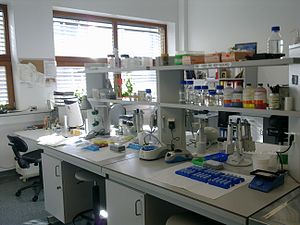
LABORATORY BASIC ANALYSES TRAINING CERTIFICATE
A Laboratory Basic Analyses Training Certificate is a document that demonstrates that you have successfully completed a training program that provides knowledge and skills on fundamental analyses, techniques, and instrument usage performed in a laboratory. This certificate helps individuals who want to work or are working in a laboratory environment to document their competence in commonly used analytical methods and equipment.
What is the Purpose of this Certificate?
The main purpose of this training and certificate is to provide participants with:
Teaching Basic Laboratory Techniques: Providing theoretical and practical knowledge on basic laboratory techniques such as weighing, volume measurement, solution preparation, titration, spectroscopy, and chromatography.
Developing Skills in Instrument Usage: Providing knowledge and skills on the use, maintenance, and calibration of common laboratory instruments such as balances, pH meters, spectrophotometers, and chromatographs.
Providing Information on Analytical Methods: Introducing basic analytical methods used in the analysis of different samples and teaching the principles, application areas, and limitations of these methods.
Developing Data Analysis and Interpretation Skills: Providing knowledge and skills on how to evaluate, interpret, and report the obtained analytical data.
Creating Laboratory Safety Awareness: Ensuring that they are informed about safe working principles in the laboratory, safe use of chemicals, and waste management.
Introducing Quality Control and Quality Assurance Concepts: Ensuring that they are informed about the principles of quality control and quality assurance in laboratory analyses.
Who is it For?
This training and certificate are suitable for:
Individuals who are new to working in laboratories
Laboratory technicians
Professionals such as chemists, biologists, and food engineers who use laboratory analyses
Researchers who want to improve their analytical skills
Students who want to pursue a career in the laboratory field
Laboratory personnel who want to refresh their knowledge of basic analytical techniques


What Does the Training Content Consist Of?
Laboratory Basic Analyses training programs generally cover the following topics:
Introduction to the Laboratory: Laboratory rules, safety precautions, glassware, and equipment used.
Measurement and Error Analysis: Measurement units, significant figures, types of errors, and calculations.
Weighing Techniques: Types of balances, their use, and calibration.
Volume Measurement: Use and calibration of volumetric instruments such as pipettes, burettes, and graduated cylinders.
Solution Preparation: Methods and calculations for preparing solutions of different concentrations.
pH and Buffer Solutions: The concept of pH, use and calibration of pH meters, and preparation of buffer solutions.
Titrations: Acid-base, redox, complexometric titrations, and application examples.
Spectroscopy: UV-Visible spectroscopy, its principles, instrument operation, and applications.
Chromatography: Basic chromatographic separation techniques (thin-layer, column, gas chromatography) and their principles.
Basic Instrumental Analyses: Use of instruments like conductivity meters and refractometers.
Data Analysis and Reporting: Evaluation of obtained data, graphing, and report preparation.
Quality Control and Quality Assurance: Fundamentals of quality management in laboratories.
Benefits of the Certificate:
Professional Development: Contributes to professional development by providing fundamental knowledge and skills in laboratory analyses.
Improves Job Prospects: Increases job opportunities by documenting the basic competencies required for working in laboratories.
Enhances Analytical Skills: Improves analytical, data interpretation, and problem-solving skills.
Instills Safe Working Habits: Fosters safe working habits by raising awareness about laboratory safety.
Increases Quality Awareness: Enhances quality awareness and compliance with quality standards in laboratory work.
Contact Us to Start Your Laboratory Basic Analyses Training Certificate Process.
We offer affordable and effective solutions tailored to your needs.
The information presented on this website does not constitute legal advice and is intended for informational purposes only. KompassEurope.com.tr assumes no responsibility for any errors or omissions in the information contained on this website. Any decisions made or actions taken by the reader based on this information are solely at the reader's own risk, and KompassEurope.com.tr shall not be held liable for any legal consequences arising from such decisions or actions. Readers are strongly advised to seek professional legal counsel regarding their specific circumstances and concerns.
© 2025 Kompass Europe. All rights reserved. The contents of this website belong to Kompass Europe and are protected by copyright laws. Copying, publishing, distributing or any commercial use of the information on the website is possible only with written permission. By using this site, you agree to our Terms of Use and Privacy Policy.
